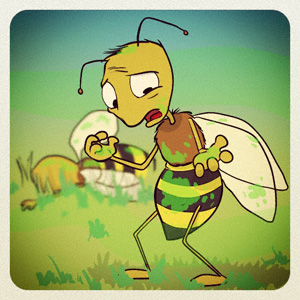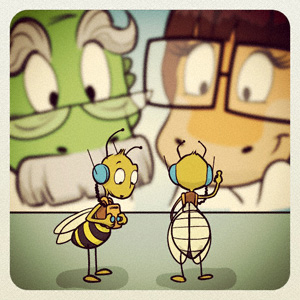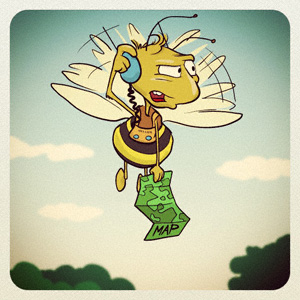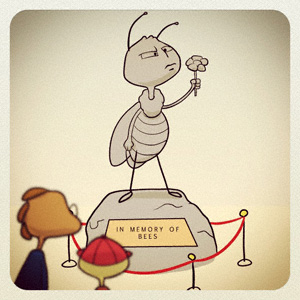- Home
- Comics
- Green Blog
-
Resources
Other Resources
-
Connect
Pesticides Linked to Bee Die-Off
In the last few years there has been a lot of concern about the dying off of the bee populations in the world. Bees are needed to pollinate crops and there is a lot of worry about what will happen to our food supply if the bees keep disappearing.
Although there has been a lot of speculation as to what the cause might be, no one has come up with a definitive answer. Pesticides have been a suspect for quite some time, but scientists have been unable to actually pinpoint them as the culprit.
The most baffling phenomenon is the Colony Collapse Disorder, which only affect honeybees.

Now two different studies by scientists in France and Britain have been published suggesting that even low levels of pesticides can have devastating effects on bee colonies by affecting their homing capabilities.
The French experiments appear to indicate that the chemicals in pesticides cloud the brains of the honeybee so they cannot navigate their way back to the hive. Britain’s scientists have come to a similar conclusion that bumble bees are not bringing back enough food to supply new queens.

Insecticides have become extremely popular and almost all corn that is grown in the United States is treated with neonicotinoids. The leading maker of the neonicotinoids, Bayer CropScience, is hesitant to embrace the results of the studies for obvious reasons, claiming that mites and virus are more likely the cause of the declining bee populations.
Still, the theory has plenty of people concerned. The researchers in France fed the honeybees sugar water with neonictinoid and them moved them a kilometre away from their hive. The scientists attached miniature radio tags to the honeybees to keep track of them. They concluded that that after exposure, in familiar territory, honeybees were 10% less likely to make it back to the hive compared to unexposed honeybees. If they were in unfamiliar territory, they were 31% less likely to make it back home.

In the British study, scientists fed the sugar and neonicotinoid to 50 bumble bee colonies and then moved them to a farm beside 25 colonies that were only fed sugar water. The scientists found that the exposed colonies produced 85% fewer queens which would mean that there were 85% fewer hives the next year.
Harvard School of Public Health has conducted their own research and they have concluded that there is strong evidence that imidacloprid, one of the most widely used pesticides is responsible for the Colony Collapse Disorder. Their study is expected to be published shortly.

My Dad says that this reminds him of when they banned DDT in the 1970's because they discovered that it was making birds shells too thin so they would break before the chicks were ready to hatch. We nearly lost several species of birds of prey to extinction like the bald eagle, osprey and peregrine falcon. Luckily they stopped using it before the damage was permanent. He says that hopefully, the same thing will happen this time because the consequences of not having bees to pollinate our crops could be catastrophic.
Blog Category:
Environmental Choices

















